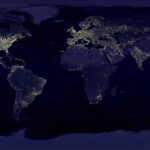Implications on public health and the consequences of climate change.
Last updated: June 2025
This project evaluates spatial inequalities in water–energy–food (WEF) security and their implications for public health in rural South Africa, while also examining the projected impacts of climate change. Insights generated from this study will facilitate the development of integrated, future-proof policies to strengthen WEF security, improve public health outcomes, and enhance the resilience of vulnerable rural communities.
South Africa is among the most unevenly developed countries, with 33% of the population living in rural areas lacking access to clean water, affordable energy, and nutritious food. Climate change exacerbates these challenges, directly and indirectly impacting on public health and wellbeing. Rural communities are particularly vulnerable to health related crises.
Map the spatial inequality in water, energy and food security and the impacts on public health across municipalities of rural South Africa.
Conceptualise how climate change affects WEF security and assess the spatial distribution of potential impacts of climate change on WEF security and the implications for health toward 2050.
Identify current and potential interventions to be applied at the local and national levels to improve WEF security and enhance the health and resilience of vulnerable rural communities in South Africa.
These outputs will facilitate the identification of priority areas, integrated policy design considering synergies and trade‐offs between sustainable development goals (SDGS), and implementing tailor‐made future‐proof interventions at the local and national levels. Thereby, this project ultimately aims to contribute to SDG‐2 ‐ Zero hunger; SDG‐3 ‐ Good health and wellbeing; SDG‐6 ‐ Clean water and sanitation; SDG‐7 ‐ Clean and affordable energy; SDG‐10 ‐ Reduced inequalities; SDG‐11‐ Sustainable cities and communities, and SDG‐13 ‐ Climate action.
The project is set up in (4) four work packages which jointly address the four project objectives to meet the overall aim. The work is executed by a postdoctoral researcher (2 years), a doctoral student (3 years) and two PhD students (both 4 years) in close collaboration with the South African and Dutch PIS, co‐applicants, and collaboration partners and their colleagues.
 Dr. Floor van der Hilst
Dr. Floor van der Hilst
(Associate Professor: Supervisor WP3 and WP4 )
Institute: Utrecht University – Copernicus Institute of Sustainable Development
Email/Website: f.vanderhilst@uu.nl-https://www.uu.nl/staff/FvanderHilst
As one of two Principal Investigators in this project, Floor manages the project and coordinates the Dutch side of the consortium. Floor is an interdisciplinarity scholar with expertise on spatial variation in environmental and socio‐economic impacts and the synergies and trade‐offs between them. She has a strong track record in international interdisciplinary project management.
 Dr. Imke de Kock
Dr. Imke de Kock
(Associate Professor: Supervisor WP1 and WP2 )
Institute: Stellenbosch University – Department of Industrial Engineering
Email/Website: Imkedk@sun.ac.za– https://researcherprofiles.sun.ac.za/6175-imke-de-kock
As Principal Investigator, Imke manages the project and coordinates the South African side of the consortium. Imke provides expertise in transition studies and the role of technologies and their management in future systems.
 Dr. Andrew Earl
Dr. Andrew Earl
(Postdoc-WP1 Lead)
Institute: Stellenbosch University – Department of Industrial Engineering
Email: 17199824@sun.ac.za
 Aishah Ebrahim
Aishah Ebrahim
(PhD candidate-WP2 Lead)
Institute: Stellenbosch University – Department of Industrial Engineering
Email/Website: Aebrahim@sun.ac.za –
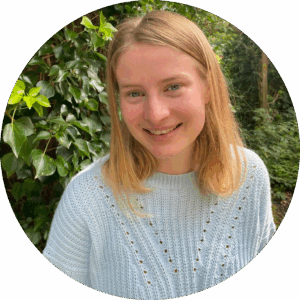 Inge Ossentjuk
Inge Ossentjuk
(PhD candidate-WP3 Lead)
Institute: Utrecht University – Copernicus Institute of Sustainable Development
Email/Website: i.m.ossentjuk@uu.nl /
 Eli Dearden
Eli Dearden
(PhD candidate-WP4 Lead)
Institute: Utrecht University – Copernicus Institute of Sustainable Development
Email: e.j.dearden@uu.nl
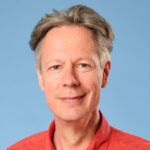
Prof. Dr. Derek Karssenberg
(Professor: Supervisor WP3 )
Institute: Utrecht University – Land Degradation and Remote Sensing
Email/Website:d.karssenberg@uu.nl
Derek Karssenberg is a Professor of Computational Geography in the Department of Physical Geography at Utrecht University (the Netherlands). He develops and applies spatio-temporal modelling techniques to address questions related to Earth surface systems and serves as the technical supervisor for Work Package 3.
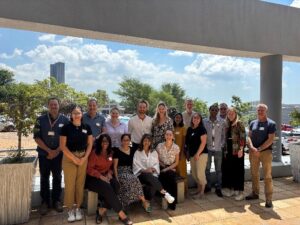
By the WEF-H Working Group
📍 Stellenbosch & Johannesburg | March 6–7, 2025
How do water, energy, and food systems shape our health? And what would it take to create a future where these systems work together to improve well-being across South Africa—especially in the face of inequality, climate change, and systemic challenges?
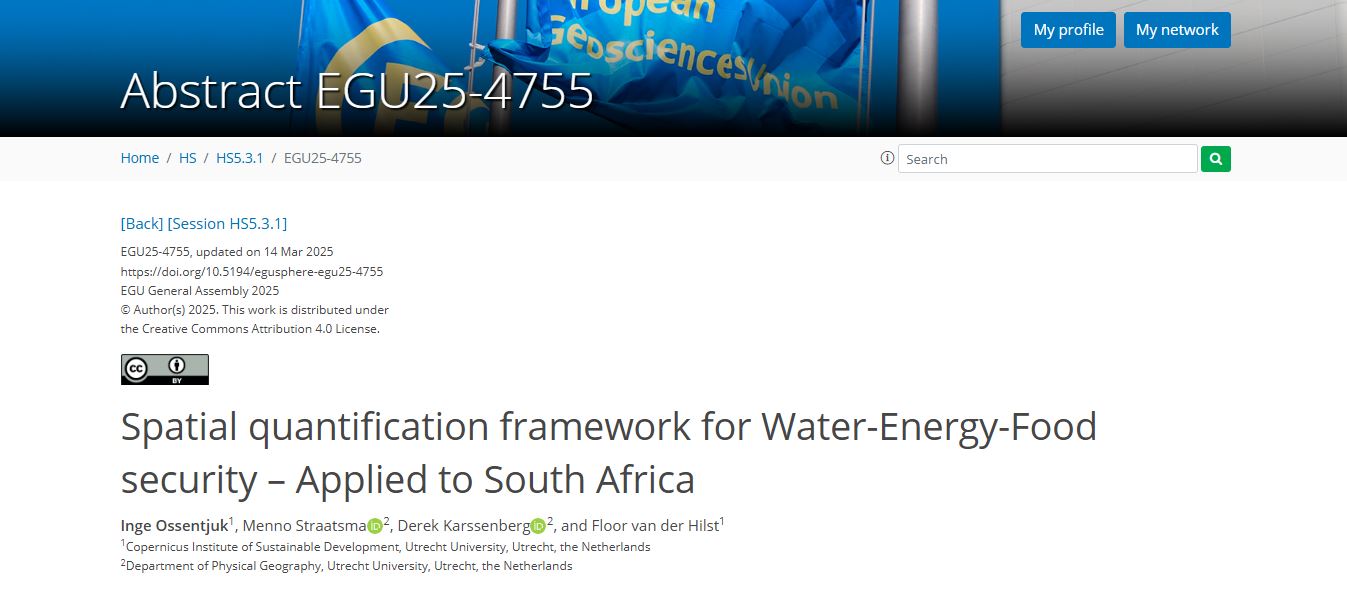


Inge Ossentjuk1, Menno Straatsma2, Derek Karssenberg2, and Floor van der Hilst1
1Copernicus Institute of Sustainable Development, Utrecht University, Utrecht, the Netherlands
2Department of Physical Geography, Utrecht University, Utrecht, the Netherlands

